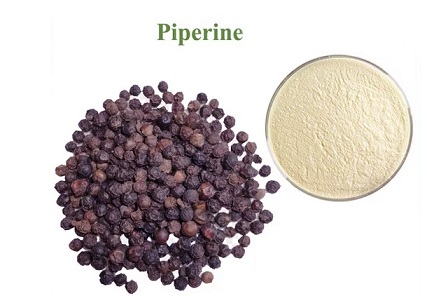Brazilian Study Finds That Piperine Offers Herbal Protection Against Paracetamol-Induced Liver Damage
Nikhil Prasad Fact checked by:Thailand Medical News Team Nov 05, 2024 1 year, 3 months, 2 days, 9 hours, 31 minutes ago
Herbs And Phytochemicals: A new study from the Federal University of Ouro Preto in Brazil has found that piperine, a natural compound found in black and long peppers, could protect the liver from damage caused by excessive paracetamol intake. Paracetamol (also known as acetaminophen) is widely used for pain relief, but overdosing on it can lead to severe liver injury, making piperine’s potential liver-protective effects particularly exciting. This
Herbs And Phytochemicals news report explores how piperine could offer a simple, natural method to reduce the risk of drug-induced liver damage, especially for those taking medications over prolonged periods.
 Brazilian Study Finds That Piperine Offers Herbal Protection Against Paracetamol-Induced Liver Damage
What the Study Discovered About Piperine and Liver Protection
Brazilian Study Finds That Piperine Offers Herbal Protection Against Paracetamol-Induced Liver Damage
What the Study Discovered About Piperine and Liver Protection
The study centers on the benefits of piperine and the promising findings from experiments on mice treated with paracetamol. Researchers at Ouro Preto administered piperine to mice before exposing them to high doses of paracetamol. Remarkably, the group treated with piperine showed significant protection against liver damage. Key liver enzymes that are often elevated in cases of liver injury, such as ALT (alanine aminotransferase) and AST (aspartate aminotransferase), were kept at near-normal levels in the piperine-treated groups.
The study highlights how piperine was effective in preventing the inflammatory and oxidative stress responses typically seen with paracetamol-induced liver injury. By regulating biomarkers associated with liver stress, such as carbonylated proteins and thiobarbituric acid reactive species (TBARS), piperine appeared to defend the liver against oxidative damage, a crucial factor in drug-induced liver toxicity.
How Piperine Reduces Liver Cell Death and Necrosis
An essential finding of the study was piperine’s impact on liver necrosis, or the death of liver cells. In the untreated group exposed only to paracetamol, a marked increase in necrosis was observed. However, mice that received piperine showed smaller necrotic areas and healthier liver tissue, suggesting that piperine helps maintain cellular integrity even under toxic conditions.
Histopathological analysis - the microscopic examination of liver tissue - revealed that the liver structure in the piperine-pretreated groups was preserved, showing fewer signs of hyperemia (increased blood flow and congestion in tissue). This outcome suggests that piperine doesn’t only minimize cell death but also controls blood flow and inflammation, which are often involved in liver damage.
Piperine’s Role in Controlling Inflammation and Oxidative Stress
Piperine was found to regulate the gene expression of several markers in the inflammasome pathway, a key player in the body’s inflammatory response.
Researchers observed that piperine pre-treatment prevented the significant increases in inflammatory cy
tokines, such as TNF-alpha, that typically occur after liver injury. These cytokines are proteins that signal an immune response, often exacerbating inflammation and cellular stress. In the untreated group, TNF-alpha levels surged, leading to greater inflammation and cellular breakdown.
The study revealed that piperine also helps balance oxidative stress markers, which play a role in liver injury. When the liver is exposed to drugs like paracetamol, it often undergoes oxidative stress, leading to cellular damage. Piperine reduced the levels of TBARS, a marker of lipid (fat) oxidation, and carbonylated proteins, which indicates damage to proteins in the liver cells.
Piperine’s Effect on Liver Gene Expression
In addition to reducing inflammation and oxidative stress, piperine influenced the liver's gene expression, particularly in the cytochrome P450 enzyme pathway. This enzyme pathway, specifically the CYP2E1 enzyme, plays a critical role in metabolizing drugs and other substances, sometimes leading to the formation of harmful byproducts. In the untreated group, the paracetamol overdose led to a drop in CYP2E1 gene expression, a potential protective mechanism by the body to limit further damage. However, in the piperine-pretreated groups, CYP2E1 levels remained similar to those of the control group, indicating that piperine might help stabilize the liver's enzymatic response to paracetamol.
Implications of Piperine’s Potential as a Liver-Protective Agent
The findings of this study suggest that piperine has significant potential as a preventive measure against drug-induced liver damage, offering a natural option to support liver health. For individuals who rely on medications long-term, piperine could be an accessible, herbal method to protect the liver. This compound’s effects on oxidative stress, inflammatory responses, and cellular integrity are promising for reducing the risks associated with drug-induced liver injury.
Conclusion: A Step Toward Herbal Alternatives in Liver Health
The results of this study are promising for the future of natural liver protectors. By reducing liver cell death, controlling inflammation, and managing oxidative stress, piperine shows potential as a simple, natural way to protect against drug-induced liver damage, particularly from paracetamol.
The study findings have highlighted piperine's prophylactic effects, suggesting that it could be a valuable tool in herbal medicine, especially for those at risk of liver injury due to chronic medication use.
The study findings were published in the peer-reviewed journal: Pharmaceuticals.
https://www.mdpi.com/1424-8247/17/11/1477
For the latest on
Herbs and Phytochemicals, keep on logging to Thailand Medical News.
Read Also:
https://www.thailandmedical.news/news/cutting-edge-natural-antidiabetic-compounds-morpholine-piperazine-and-piperidine
https://www.thailandmedical.news/news/new-study-reveals-black-pepper-compound-as-a-potential-hair-loss-treatment
